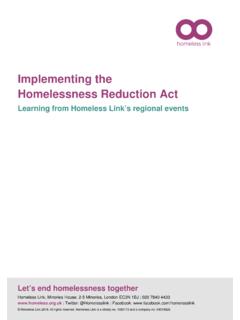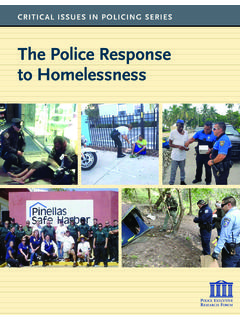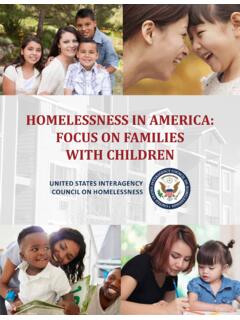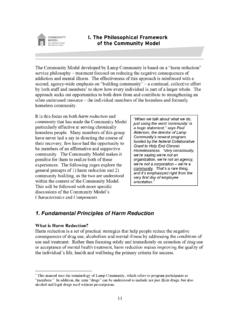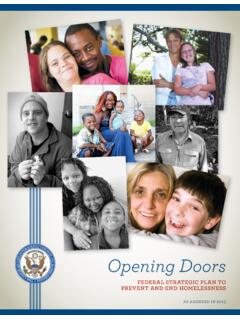Transcription of What you need to know about the Homelessness Reduction …
1 What you need to know about the Homelessness Reduction Act 2017 IntroductionThe Homelessness Reduction Bill received Royal Assent and therefore became an Act of Parliament on the 27th April 2017. The Homelessness Reduction Act 2017 will place new legal duties on English councils so that everyone who is homeless or at risk of Homelessness will have access to meaningful help, irrespective of their priority need status, as long as they are eligible for assistance. The Act will amend part VII of the Housing Act Act draws on the work of an independent panel of experts, established by Crisis (the national charity for single homeless people) in 2015 which favoured a framework similar the one introduced by the Housing (Wales) Act 2014. The expert panel s aim was to assess the strengths and weaknesses of the current legislation affecting single homeless people in England and to propose improvements to the legal framework to prevent and tackle single Homelessness more effectively in England, without undermining the rights people currently have under the existing system.
2 The new framework began as a Private Member s Bill introduced to Parliament in June 2016 by Bob Blackman, backbench Conservative MP for Harrow East. The Bill was published following a Homelessness inquiry conducted by the cross-party Communities and Local Government (CLG) Select Committee and takes into account the recommendations of the Committee s pre-legislative inquiry. This briefing outlines the main measures being introduced by the Homelessness Reduction Act 2017. Definition of Homelessness / threatened homelessnessPart VII of the Housing Act 1996, as amended by the Homelessness Act 2002, sets out the duties owed by English local housing authorities (LAs) to someone who is homeless or threatened with Homelessness . Section 175 of the 1996 Act defines that a person is threatened with Homelessness if it is likely that they will become homeless within 28 days.
3 The Homelessness Reduction Act 2017 extends the number of days from 28 to 56. In addition, people who have received a valid notice under section 21 of the Housing Act 1988 and the expiry date is within 56 days, will be treated as being threatened with to provide advisory servicesCurrently, section 179 of the 1996 Act places a general duty on English LAs to ensure that advice and information about Homelessness , and preventing Homelessness , is available free of charge to everyone in their district. Under the 2017 Act, LAs would be required to provide or secure the provision of free services to give people in their area information and advice on: preventing Homelessness securing accommodation if homeless the rights of people who are homeless or threatened with Homelessness , and any help that is available for people who are homeless or likely to become homeless as well as how to access that helpLAs would be required to ensure services are designed to meet the needs of particular groups that are at increased risk of becoming homeless with us.
4 Improve with us. Influence with 7685 with us. Improve with us. Influence with 7685 1789including (but not limited to); care leavers, people leaving prison, people who have left the regular armed forces, victims of domestic abuse, people leaving hospital and people suffering from a mental illness or impairment. New dutiesCurrently LAs in England are required to make inquiries to establish what duty, if any, is owed to someone seeking Homelessness assistance. As part of LAs investigations, they must determine if an applicant has a priority need for Homelessness assistance. Categories of priority need are set out in section 189 of the 1996 Act, and are extended by the Homelessness (Priority Need for Accommodation) (England Order) who are found to be in priority need and unintentionally homeless are owed what is referred to as the full housing duty meaning LAs are obliged to secure that suitable accommodation is made available for them.
5 However, non-priority need households, which are most likely to be single people without children, or childless couples, are owed the advice and assistance duty only. The 2017 Act would legally oblige LAs to assess and provide more meaningful assistance to all people who are eligible and homeless or threatened with Homelessness , irrespective of their priority need status. Duty to assess all eligible applicants cases and agree a planThe first step in the amended framework is for LAs, once they are satisfied someone is homeless or threatened with Homelessness and also eligible for assistance, to carry out an assessment of the applicant s case. These assessments should include the circumstances that have caused Homelessness and the housing and support needs of the applicant and their household.
6 LAs must aim to reach an agreement with applicants on a personalised plan which must be recorded and should set out the steps the applicant and the authority are required to take to ensure accommodation is secured and/or retained. Applicants assessments and agreements must be kept under constant review until the LA has determined that no other duty is owed to the applicant under part VII of the 1996 Act. The prevention duty : In cases of threatened Homelessness If an LA is satisfied that an applicant is threatened with Homelessness and is eligible for assistance, they must take reasonable steps with reference to the applicant s assessment - to help them avoid becoming triggered, the prevention duty would continue for 56 days - or longer if a valid section 21 notice has expired and no alternative accommodation has been secured - unless it is brought to an end via one of the prescribed conditions.
7 Applicants will have a right to request a review of a decision to end this relief duty: In cases where the applicant is homelessUnder this clause, LAs must take reasonable steps with reference to the applicant s assessment - to help all homeless eligible applicants to secure accommodation for at least six months unless the applicant is referred to another local authority due to having no local connection to the authority they have applied triggered, the relief duty would continue for 56 days unless it is brought to an end via one of the prescribed conditions. Applicants will have a right to request a review of a decision to end this with us. Improve with us. Influence with 7685 1789 Interim accommodation duties owed to people under the existing provisions (section 188) continue to apply during this stage the duty to provide accommodation to people who the LA have reason to believe may be homeless, eligible for assistance and in priority need - pending a decision on whether the council is obliged to provide some form of longer term settled to co-operate by an applicant for assistanceThis provision will place a requirement on all applicants to cooperate with LAs attempts to comply with their prevention and/or relief duties.
8 If an LA considers that an applicant has deliberately and unreasonably refused to cooperate or take any of the steps set out in the personalised plan, they can serve a notice on the applicant to notify them of their decision as long as the notice explains, what the consequences of the decision are and that they have a right to request a review of the decision. Notice can only be served if LAs have provided a relevant warning to the applicant and a reasonable period has elapsed since the warning was given. Consequences of deliberately and unreasonably refusing to cooperate include the ending of the prevention and/or relief duties and in cases where the applicant would normally be owed the full housing duty (section 193), this duty would be limited to securing that accommodation is made available for their occupation for a temporary period until the applicant either.
9 Ceases to be eligible for assistance becomes homeless intentionally from accommodation made available for the applicant s occupation accepts an offer of an assured tenancy from a private landlord, or decides to cease occupation of the accommodation made available to them accepts or refuses a final offer of accommodation In deciding whether an applicant has deliberately or unreasonably refused to cooperate, LAs must take into account the applicant s particular circumstances and needs. In addition, the Secretary of State may set out regulations to stipulate the procedures for LAs to follow when serving notices under this leaversAll care leavers under the age of 21 will be considered as having a local connection with an area if they were looked after, accommodated or fostered there for a continuous period of at least two code of practiceCurrently LAs are required to have regard to the Homelessness Code of Guidance for Local Authorities when carrying out their part VII functions.
10 The 2017 Act includes a provision that would allow the Secretary of State to provide LAs with one or more codes of practice, that LAs must have regard to, on how they exercise and monitor their functions under Part VII and staff training. Public authority duty to referWhere a specified public authority considers that someone they are working with is or may be homeless or threatened with Homelessness , they must refer that person s details to a local housing authority but only if the person agrees to the notification being details about what is meant by specified public authorities will be set out in regulations. with us. Improve with us. Influence with 7685 1789 Other changesSeveral other sections of the 1996 Act are amended to take into account the new measures, including where a case is referred to another authority and the right to request a review.










